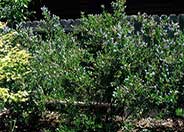
Common name:Purple Sage
Botanical name:Salvia leucophylla
The Purple Sage is an evergreen shrub that grows 2'-3' tall and 5'-6' wide. It has white stems and leaves and light purple flowers that bloom between May and June. This shrub tolerates heat and drought. The Purple Sage is a California native.

Common name:California Poppy, Golden Poppy
Botanical name:Eschscholzia californica
This small annual (sometimes acts as a perennial) plant will grow to less than 1' tall and has light, small blue green leaves with gold and orange flowers that bloom in spring and summer.

Common name:Blue Blossom Ceanothus
Botanical name:Ceanothus thyrsiflorus 'Skylark'
The blue blossom ceanothus is a shrub that has dark blue flower clusters that bloom profusely. This smaller growing selection grows to 6' high and 4'-6' wide. This shrub attracts butterflies, hummingbirds and beneficial insects. Its native counterpart can be found from sea level to 1500' elevations in mixed evergreen and redwood forests of the Coast Ranges.

Common name:Sugar Bush
Botanical name:Rhus ovata
This dense, rounded evergreen shrub grows 8'-15' tall and wide, with creamy flowers between March and May. The shrub bears small red fruit. It grows well in inland areas and is drought tolerant. The foliage is leathery and rich looking and dark green in color. It needs additional water in low desert areas every 2 weeks or plant in area with afternoon shade. It needs a well drained site. It is susceptible to verticillium wilt in wet areas.

Common name:Blue Blossom Ceanothus
Botanical name:Ceanothus thyrsiflorus 'Skylark'
The blue blossom ceanothus is a shrub that has dark blue flower clusters that bloom profusely. This smaller growing selection grows to 6' high and 4'-6' wide. This shrub attracts butterflies, hummingbirds and beneficial insects. Its native counterpart can be found from sea level to 1500' elevations in mixed evergreen and redwood forests of the Coast Ranges.

Common name:Coast Live Oak
Botanical name:Quercus agrifolia
The Coast Live Oak is an evergreen round headed tree. It can reach 15'-40' high and 20' wide; it grows very well from the coastal areas to the interior valleys. It is native to California, is drought tolerant, and attracts butterflies.
Dealing With Drought
More than half of the water used at your home is for outside purposes. Studies show that on average, half of the water used outdoors is wasted. The leading cause of waste is incorrectly set and poorly managed irrigation controllers. The second biggest cause of wastage is broken irrigation equipment that goes undetected. There are a few basic things you can do to make a big difference in your water use.
Click in the green box for more information
| Designer: Santa Barbara Botanic Garden | Santa Barbara Botanic Garden: Path |
Photographer: GardenSoft |
Soils and Compost:
Incorporate compost 6" into your soil to retain water, reduce compaction, feed earthworms, and provide valuable nutrients to your plants.
Water Saving Tip:
Integrated Pest Management:
Drip and other smart irrigation delivers water directly to roots, allowing no excess water for weeds.
